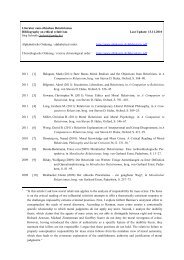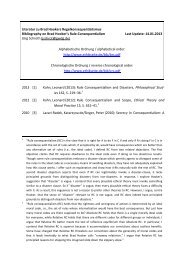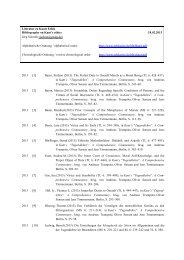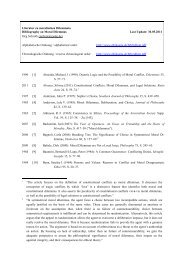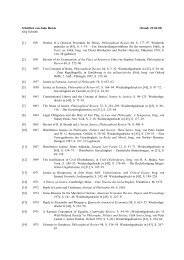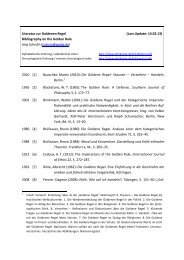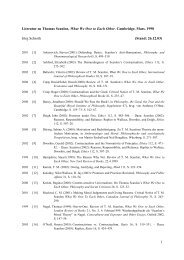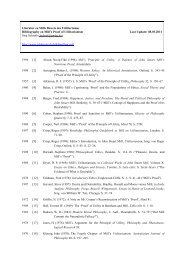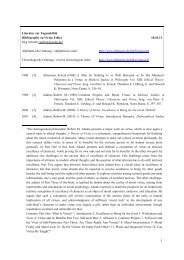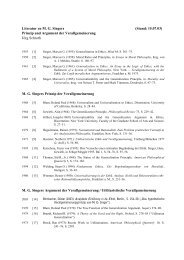Literatur zu Kants Ethik - Ethikseite
Literatur zu Kants Ethik - Ethikseite
Literatur zu Kants Ethik - Ethikseite
You also want an ePaper? Increase the reach of your titles
YUMPU automatically turns print PDFs into web optimized ePapers that Google loves.
1971 [452] Hess, Heinz-Jürgen (1971): Die obersten Grundsätze Kantischer <strong>Ethik</strong> und ihre<br />
Konkretisierbarkeit, Bonn (Kant-Studien Ergän<strong>zu</strong>ngsheft 102).<br />
2008 [453] Heubel, Friedrich/Manzeschke, Arne (2008): <strong>Kants</strong> kategorischer Imperativ als Management-<br />
Technik und Marketing-Strategie?, <strong>Ethik</strong> in der Medizin 20, S. 86–93. 59<br />
1980 [454] Heyd, David (1980): Beyond the Call of Duty in Kant’s Ethics, Kant-Studien 71, S. 308–24.<br />
1982 [455] Heyd, David (1982): Supererogation. Its Status in Ethical Theory, Cambridge, S. 49–72 (“The<br />
Morality of Duty: Kant on Supererogation”).<br />
1997 [456] Heyd, David (1997): Moral and Legal Luck. Kant’s Reconciliation with Practical Contingency,<br />
Jahrbuch für Recht und <strong>Ethik</strong> 5, hrsg. von B. Sharon Byrd, Joachim Hruschka und<br />
Jan C. Joerden, S. 27–42.<br />
1971 [457] Hill, Jr., Thomas E. (1971): Kant on Imperfect Duty and Supererogation, Kant-Studien, S. 55–<br />
76. Wiederabgedruckt in Hill, Dignity and Practical Reason in Kant’s Moral Theory,<br />
Ithaca 1992, S. 147–75.<br />
1972 [458] Hill, Jr., Thomas E. (1972): The Kingdom of Ends, in Proceedings of the Third International<br />
Kant Congress, hrsg. von Lewis White Beck, Dordrecht, S. 307–15.<br />
Wiederabgedruckt in Hill, Dignity and Practical Reason in Kant’s Moral Theory,<br />
Ithaca 1992, S. 58–66.<br />
1973 [459] Hill, Jr., Thomas E. (1973): The Hypothetical Imperative, Philosophical Review 82, S. 429–50.<br />
Wiederabgedruckt in Hill, Dignity and Practical Reason in Kant’s Moral Theory,<br />
Ithaca 1992, S. 17–37.<br />
59 „Eine der deutschen Krankenhausketten versucht, ihr Geschäftsmodell u. a. auf Elemente der <strong>Kants</strong>chen<br />
Moralphilosophie <strong>zu</strong> stützen. In den Dienstverträgen der führenden Manager werden Verhaltensnormen<br />
spezifiziert, und es wird auf den kategorischen Imperativ Be<strong>zu</strong>g genommen. Frage ist, ob dies mit der<br />
<strong>Kants</strong>chen <strong>Ethik</strong> vereinbar ist, und ob es sich da<strong>zu</strong> eignet, moralischen Anforderungen an Krankenhäuser<br />
besser gerecht <strong>zu</strong> werden. Eine Analyse der einschlägigen Texte zeigt, dass <strong>Kants</strong> kategorischer Imperativ<br />
mit der Goldenen Regel gleichgesetzt wird, wogegen Kant sich ausdrücklich gewehrt hat. Die Goldene<br />
Regel wird außerdem entstellt. Dass der kategorische Imperativ nicht nur Achtungs-, sondern auch<br />
Fürsorgepflichten normiert, wird übersehen. Es bleibt offen, ob aus der <strong>Kants</strong>chen <strong>Ethik</strong> nicht doch<br />
Folgerungen für die Krankenhausorganisation <strong>zu</strong> ziehen sind, der hier kritisierte Versuch ist jedoch<br />
missglückt, weil – ganz abgesehen von den Anwendungsproblemen – schon die <strong>Kants</strong>chen Konzepte<br />
missverstanden wurden. Immerhin zeigt der Versuch, dass es im Management ein Bewusstsein für die<br />
Wichtigkeit moralischer Vorgaben im Krankenhaus gibt.“<br />
“Problem One of the German commercial hospital chains is trying to ground their business policy on<br />
elements of Kantian moral philosophy. Allegedly, the categorical imperative is inserted as a norm of<br />
conduct into the contracts of leading officers. We discuss whether the reference to Kantian ethics is sound<br />
and is suited to improving the moral standards of hospitals.<br />
Arguments Scrutiny of the companies’ statements reveals that the categorical imperative is equated with<br />
the Golden Rule, which Kant explicitly rejects, and that the Golden Rule is distored. In addition, the texts<br />
ignore that the categorical imperative entails not only duties of respect but also duties of beneficence.<br />
Conclusion Kantian arguments may indeed have some impact on hospital organisation but if so they<br />
should be genuine. In the case at stake, they are misused. However, even this misuse indicates an intuition<br />
that running a hospital includes moral demands.”



